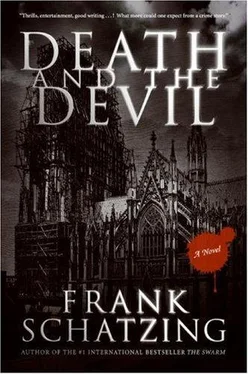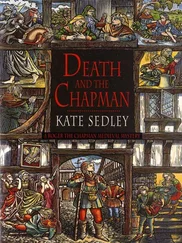“My father,” Jacob mused, “was always talking about how impotent sinful mankind was. That we had no choice to decide anything for ourselves.”
“And that’s what you believe, too?”
“No.”
“Goddert believes that.” Jaspar sighed. “And there are many like him, men who have no real convictions and confuse weakness with faith. He drifts from one view to another, picks up a bit of each, but never the real point, and patches together something out of them he likes to think of as his opinion. Oh, he enjoys an argument. We spend all the day in disputations on everything under the sun, but they never lead anywhere. It’s just good fun, concealing the sad fact that Goddert has no real opinion. I know I shouldn’t talk about him like that, but he’s typical of the unfortunate attitude prevailing today. When people stop forming their own opinions, when they take bits for a whole and don’t look for connections, then the world becomes a church with no mortar between the stones. One day it’ll collapse spectacularly and people will talk of the coming of the Antichrist, whom Saint Bernard conjured up in vivid words like no one before or since. But the Antichrist is no fiendish destroyer, no horned devil, nor a beast rising from the sea. The Antichrist is a product of the Christians. He is the emptiness behind a faith that knows only inertia and punishment. And he is also the emptiness behind the fatalism you have been sucked into, the emptiness in your life. One could say the Devil’s just waiting to take possession of you.”
Jacob found Jaspar’s words almost physically painful. “Hasn’t he already?” he asked. “At our house. Aren’t I lost for good?”
“No, you are not!” said Jaspar emphatically. “It’s your refusal to accept that life goes on, that you can’t change the past, just giving up and running away, that’s what the Devil is.”
“You mean he doesn’t exist?” Jacob shook his head. “Not as a—being?”
“What is devilish is to deny human nature, our ability to reason, our free will, just as the blind persecution of heretics is the work of the devil. There is nothing more arrogant than fanatical humility. But reason without faith is equally devilish and every man who is enslaved, whether to reason or to faith, is blind in his own way. Christendom is being consumed by a war waged by the blind. That is what the Cistercians, what Bernard and William of Saint-Thierry mean when they talk of the impotence of sinful mankind, that we cannot act because, they say, God does not want us to act; because every independent action represents a denial of God’s omnipotence and therefore heresy; and because anyone who cannot act can happily be blind, indeed must be, of necessity. But if one were to follow that idea through to its logical conclusion, the blind couldn’t undertake anything of their own volition, not send the sighted, or other blind men, to the stake, not wage war, not teach in public; from the point of view of pure logic, they could not even exist. But they do exist, they talk of impotence and exercise power, they preach humility and humiliate others. What weakness of intellect! That, Fox-cub, is the Devil I believe in.”
Jacob tried to digest all this. “If that’s what the Devil’s like,” he said slowly, “then who or what is God?”
Jaspar did not answer straightaway, but when he did there was a mild undertone of mockery in his voice. “How should I know who God is?”
“No, I mean—I always thought that God and the Devil, they were—” He was struggling for words.
“You think God and the Devil are persons, in a way?”
“Yes.”
“To be honest, I don’t know. All I can do is tell you what God is for me, if that’s what you’re asking. Abelard was of the opinion that we can distinguish between what is sin and what is not. We have a choice. Of course we can’t, as you so touchingly put it, turn the clock back. But we can own up to our actions and accept responsibility for them. Do you see what that implies? Everything was made by God, but perhaps not everything is willed by God. Perhaps God’s will is that we should use our own willpower, that we should develop His ideas because we are His ideas. If God is in everything and we are therefore God, then our impotence would be God’s impotence, and that is something which, with the best will in the world, I simply can’t imagine. But if God is the creative principle, then, in order to carry out His will, we too must be creative, we must accept responsibility for what we do. God is the alliance between reason and the beauty of faith, what the scholars call reason illumined by faith. He is harmony; He is what connects, not separates, creation; He is creativity proceeding within time. But above all, God is the free will of the whole of creation, which is constantly re-creating itself; He is the free will of each individual. And that means you can still turn back, Jacob. You have faced up to the past. Sins can be forgiven. Forgive yourself. Stop running away, there are people who need you.”
There was a soft thrum of rain on the shed. Jacob listened to the sound as if he were hearing it for the first time. He had the feeling he should go out and discover the world anew. “Thank you,” he said quietly.
“Don’t mention it, Fox-cub. But if you don’t mind, I need to sleep for an hour or so.”
“Sleep?” Jacob exclaimed in surprise. “Now?”
“Yes. Why not?”
“We have to do something. Urquhart will be—”
“Urquhart will be licking his wounds. It’s the middle of the night. Do you want to get Conrad out of his bed? God knows, we need some rest. Don’t worry, I’ll wake you when it’s time.”
Uncertainly, Jacob lay down. “I won’t get to sleep,” he said.
“Pity.”
How can I sleep, he thought, after everything that’s happened? I’ll lie awake, and eventually Jaspar will start snoring and sleep will be even more impossible. We ought to be making use of the time.
His thoughts turned to Richmodis.
I won’t get any sleep, he thought.
“Wake up!”
Someone was shaking him. For a moment he thought he was under his arch in the Wall, then he sat up. It was still dark, but he vaguely recognized Jaspar’s silhouette. He was laughing. “So this is the lad who can’t get to sleep?”
“What time is it?”
“The watchman called three o’clock not long ago. The procession starts in two hours, so you have plenty of time to ask for an audience in the archbishop’s palace. Then we’ll meet between the fourth and fifth hour in Seidenmachergäßchen. It’s nice and quiet there on a Sunday morning. Let’s say by the city weighhouse.”
“Just a moment,” said Jacob, rubbing his eyes. “What’s all this about meeting? I thought we were going together.”
“So did I. But I had an idea while you were sleeping. It’s connected with your story. I’m going somewhere else.”
“To Goddert’s house, perhaps?”
“I’d like to.”
“So would I, dammit!”
“But we’d be fools to let ourselves be seen on the Brook at this juncture. Not now. Off you go, and make sure you keep that forest fire you have on your head well covered on your way to the palace.”
Jacob stood up and stretched. Tried to, at least. His body was probably black and blue from being hammered against the shutters. “What do you have in mind?” he groaned.
“I’m—” Jaspar patted him on the shoulder. “Tell you later. You know where the weighhouse is?”
“Yes.”
“Good. If I don’t see you there, I’ll assume your mission has been successful and go along to the palace.”
“Why can’t you tell me where you’re going?”
“Because it won’t get us anywhere just now and would take too long to explain. Off you go, and keep out of Urquhart’s way. He’ll be blazing mad at you.”
Читать дальше












